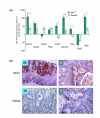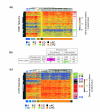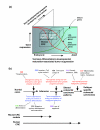Transcriptional recapitulation and subversion of embryonic colon development by mouse colon tumor models and human colon cancer
- PMID: 17615082
- PMCID: PMC2323222
- DOI: 10.1186/gb-2007-8-7-r131
Transcriptional recapitulation and subversion of embryonic colon development by mouse colon tumor models and human colon cancer
Abstract
Background: The expression of carcino-embryonic antigen by colorectal cancer is an example of oncogenic activation of embryonic gene expression. Hypothesizing that oncogenesis-recapitulating-ontogenesis may represent a broad programmatic commitment, we compared gene expression patterns of human colorectal cancers (CRCs) and mouse colon tumor models to those of mouse colon development embryonic days 13.5-18.5.
Results: We report here that 39 colon tumors from four independent mouse models and 100 human CRCs encompassing all clinical stages shared a striking recapitulation of embryonic colon gene expression. Compared to normal adult colon, all mouse and human tumors over-expressed a large cluster of genes highly enriched for functional association to the control of cell cycle progression, proliferation, and migration, including those encoding MYC, AKT2, PLK1 and SPARC. Mouse tumors positive for nuclear beta-catenin shifted the shared embryonic pattern to that of early development. Human and mouse tumors differed from normal embryonic colon by their loss of expression modules enriched for tumor suppressors (EDNRB, HSPE, KIT and LSP1). Human CRC adenocarcinomas lost an additional suppressor module (IGFBP4, MAP4K1, PDGFRA, STAB1 and WNT4). Many human tumor samples also gained expression of a coordinately regulated module associated with advanced malignancy (ABCC1, FOXO3A, LIF, PIK3R1, PRNP, TNC, TIMP3 and VEGF).
Conclusion: Cross-species, developmental, and multi-model gene expression patterning comparisons provide an integrated and versatile framework for definition of transcriptional programs associated with oncogenesis. This approach also provides a general method for identifying pattern-specific biomarkers and therapeutic targets. This delineation and categorization of developmental and non-developmental activator and suppressor gene modules can thus facilitate the formulation of sophisticated hypotheses to evaluate potential synergistic effects of targeting within- and between-modules for next-generation combinatorial therapeutics and improved mouse models.
Figures








Similar articles
-
Expression of osteopontin, a target gene of de-regulated Wnt signaling, predicts survival in colon cancer.Int J Cancer. 2007 Oct 15;121(8):1717-23. doi: 10.1002/ijc.22868. Int J Cancer. 2007. PMID: 17565744
-
ITF2 prevents activation of the β-catenin-TCF4 complex in colon cancer cells and levels decrease with tumor progression.Gastroenterology. 2014 Aug;147(2):430-442.e8. doi: 10.1053/j.gastro.2014.04.047. Epub 2014 May 15. Gastroenterology. 2014. PMID: 24846398
-
Transcriptional profiles of intestinal tumors in Apc(Min) mice are unique from those of embryonic intestine and identify novel gene targets dysregulated in human colorectal tumors.Cancer Res. 2005 Jan 1;65(1):166-76. Cancer Res. 2005. PMID: 15665292
-
Vitamin D and Wnt/beta-catenin pathway in colon cancer: role and regulation of DICKKOPF genes.Anticancer Res. 2008 Sep-Oct;28(5A):2613-23. Anticancer Res. 2008. PMID: 19035286 Review.
-
The developmental hourglass model and recapitulation: An attempt to integrate the two models.J Exp Zool B Mol Dev Evol. 2022 Jan;338(1-2):76-86. doi: 10.1002/jez.b.23027. Epub 2021 Jan 27. J Exp Zool B Mol Dev Evol. 2022. PMID: 33503326 Free PMC article. Review.
Cited by
-
Ajuba Phosphorylation by CDK1 Promotes Cell Proliferation and Tumorigenesis.J Biol Chem. 2016 Jul 8;291(28):14761-72. doi: 10.1074/jbc.M116.722751. Epub 2016 May 18. J Biol Chem. 2016. PMID: 27226586 Free PMC article.
-
YAP promotes the proliferation and migration of colorectal cancer cells through the Glut3/AMPK signaling pathway.Oncol Lett. 2021 Apr;21(4):312. doi: 10.3892/ol.2021.12573. Epub 2021 Feb 23. Oncol Lett. 2021. PMID: 33692844 Free PMC article.
-
The hnRNPK/A1/R/U Complex Regulates Gene Transcription and Translation and is a Favorable Prognostic Biomarker for Human Colorectal Adenocarcinoma.Front Oncol. 2022 Jul 7;12:845931. doi: 10.3389/fonc.2022.845931. eCollection 2022. Front Oncol. 2022. PMID: 35875075 Free PMC article.
-
Cellular expression patterns of genes upregulated in murine and human colonic neoplasms.J Histochem Cytochem. 2008 May;56(5):433-41. doi: 10.1369/jhc.7A7359.2008. Epub 2008 Jan 7. J Histochem Cytochem. 2008. PMID: 18180384 Free PMC article.
-
Loss of Rb1 in the gastrointestinal tract of Apc1638N mice promotes tumors of the cecum and proximal colon.Proc Natl Acad Sci U S A. 2008 Oct 7;105(40):15493-8. doi: 10.1073/pnas.0802933105. Epub 2008 Oct 1. Proc Natl Acad Sci U S A. 2008. PMID: 18832169 Free PMC article.
References
-
- Brabletz T, Hlubek F, Spaderna S, Schmalhofer O, Hiendlmeyer E, Jung A, Kirchner T. Invasion and metastasis in colorectal cancer: epithelial-mesenchymal transition, mesenchymal-epithelial transition, stem cells and beta-catenin. Cells Tissues Organs. 2005;179:56–65. doi: 10.1159/000084509. - DOI - PubMed
-
- Kaihara T, Kusaka T, Nishi M, Kawamata H, Imura J, Kitajima K, Itoh-Minami R, Aoyama N, Kasuga M, Oda Y, et al. Dedifferentiation and decreased expression of adhesion molecules, E-cadherin and ZO-1, in colorectal cancer are closely related to liver metastasis. J Exp Clin Cancer Res. 2003;22:117–123. - PubMed
Publication types
MeSH terms
Substances
Grants and funding
- R01 CA079869/CA/NCI NIH HHS/United States
- R01 CA063507/CA/NCI NIH HHS/United States
- R24 DK 064403/DK/NIDDK NIH HHS/United States
- T32 HL07382-28/HL/NHLBI NIH HHS/United States
- P50 CA095103/CA/NCI NIH HHS/United States
- R01 CA046413/CA/NCI NIH HHS/United States
- P50 CA95103/CA/NCI NIH HHS/United States
- U01 CA84227/CA/NCI NIH HHS/United States
- R37 CA063677/CA/NCI NIH HHS/United States
- U01 CA084239/CA/NCI NIH HHS/United States
- T32 HL007382/HL/NHLBI NIH HHS/United States
- R24 DK064403/DK/NIDDK NIH HHS/United States
- U01 CA105417/CA/NCI NIH HHS/United States
- U01 CA84239/CA/NCI NIH HHS/United States
- P50 CA106991/CA/NCI NIH HHS/United States
- U01 CA98013/CA/NCI NIH HHS/United States
- R37 CA63677/CA/NCI NIH HHS/United States
LinkOut - more resources
Full Text Sources
Other Literature Sources
Molecular Biology Databases
Research Materials
Miscellaneous

